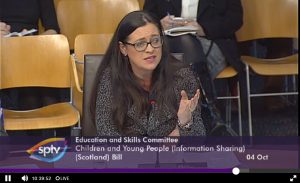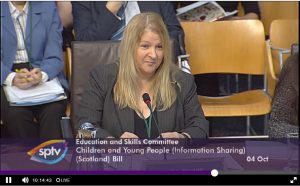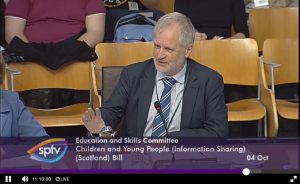Blog
Keeping you up to date on the progress of the Named Person scheme and the NO2NP campaign.
‘Unworkable’ Named Person Bill blocked by Holyrood committee
Posted 8 years agoHolyrood’s Education and Skills Committee has refused to back the Named Person information sharing Bill, in what may be the biggest setback to the scheme since it was declared unlawful by the UK Supreme Court last year.
Yesterday, the Committee told Deputy First Minister John Swinney that they cannot properly assess the Bill until they have an “authoritative draft” of the Code of Practice explaining how it will operate. Mr Swinney has previously said he is “not minded” to consult on the Code of Practice until the legislation has passed.
The Committee’s letter said that without the code “the majority of the Committee do not consider that they are able to make a decision on whether to recommend that the general principles of the bill be approved”.
In taking this action the Committee has rejected John Swinney’s attempt to railroad through the legislation without addressing the concerns of the UK Supreme Court.
Mr Swinney responded to the Committee’s decision by announcing he will form a new independent panel to try to persuade the public that the Named Person policy is ‘workable’.
NO2NP spokesman Simon Calvert commented: “This is further evidence of the terrible handling of this policy. The Committee has shown it will not have the wool pulled over its eyes and has bravely stood up to John Swinney.
“Initially he and the Scottish Government tried to steamroller through this deeply flawed and unworkable Bill without giving MSPs the chance to see the crucial details of how it would work in practice.
“Expert witnesses from the legal world and practitioners who will have to work with this scheme have all warned about the dangers and shortcomings of this Bill.
“The Committee has taken heed of that evidence – unlike the Government, which has ploughed on regardless. Now it is being forced to go back and think again.
“John Swinney cannot ignore this and must act on the Committee’s letter. He’s kept MSPs, parents and practitioners in the dark. It’s time he saw the light and consigned this appalling legislation to the Holyrood dustbin. It’s clearly not fit for purpose. MSPs know that. Parents and practitioners know that too. In fact everyone seems to know that except the Scottish Government.
“As things stand, the legal advice we have received is that the new Bill is vulnerable to more court action with good prospects of a victory for any challenge.”
In a parting shot, the Committee also addressed accusations that the Scottish Government had applied pressure to some of the witnesses who are before it to give evidence, demanding reassurances that the Government had not “sought to directly influence evidence to the Committee”.
‘Postcards from the Fringe’: Families give evidence about Named Persons
Posted 8 years agoGuest blog by Lesley Scott of Tymes Trust and Alison Preuss of Scottish Home Education Forum
Evidence from families affected by GIRFEC shows parents shun family services as they do not trust Named Person scheme
A ‘fringe’ event was held in Edinburgh on 15 November to hear families’ own testimonies on the Children and Young People (Information Sharing) (Scotland) Bill, which is currently before the Education and Skills Committee of the Scottish Parliament.
Although the Government has claimed the new Bill will remedy the defects of the Children and Young People (Scotland) Act 2014, those adversely affected by the GIRFEC policy and the premature implementation of the Named Person scheme were excluded from Holyrood’s invitation-only evidence sessions and focus groups. In order to redress the balance, Tymes Trust and the Scottish Home Education Forum issued their own call for evidence.
‘Postcards from the fringe’ allowed attendees-in-person to respond to questions that had arisen from over 90 pieces of evidence submitted, and to raise other points for discussion.
A delegation of parents and children later visited the Scottish Parliament to deliver their evidence (www.np-fringe.uk/the-evidence) to James Dornan MSP, convener of the Education and Skills Committee.
Desired outcomes from the fringe event
- Scrap the current bill. It cannot change the legal framework or consent threshold upheld by the Supreme Court.
- A public inquiry into how unfettered mass data misuse became embedded in policy and practice, as admitted on the record by ‘services’ acting on unlawful Government guidance.
- Access to justice for those who have had their rights infringed and are still suffering harassment.
- Removal of legal immunity for professionals who breach data protection law and act beyond their powers.
- Fully consent-based model for any ‘wellbeing’ data processing, from collection to deletion, with special protection from coercion for children in schools and ‘care’ settings.
- Recognition of parents as experts on their own children.
- Urgent review of information governance and data security.
Reflections from the fringe
Participants were asked whether they believed the new Bill would satisfy the terms of last year’s Supreme Court ruling, which struck down key provisions of the 2014 Act, and how they thought the Government and Parliament should proceed in the face of continuing opposition to its proposed legislation and an overarching policy framework which places state outcomes above citizens’ autonomy.
Much discussion focused on the data sharing and undefined, subjective notion of ‘wellbeing’ on which the Named Person scheme and wider GIRFEC policy rely, and inconsistent messaging (support or mass surveillance?). Families noted their irrevocable loss of trust in public/third sector providers, which has already resulted in avoidance of services, refusal to disclose information that may be misused or lost, covert recording of all engagements with professionals, opt-out from health visiting, nurseries and, increasingly, schools.
Other recurrent themes were the lack of access to justice for those whose human rights had been, and continue to be, infringed by public and third sector bodies, and the lack of accountability of those who failed to get it right in the face of case law and legal opinion that had predicted the outcome of the judicial review.
Families believed their own evidence and experiences had been filtered out in order to push through legislation and a code of practice whose only purpose is to seek circumvention of the Supreme Court ruling.
Many people were of course unable to attend the daytime event on 15 November. The event was held during the day so that we could hand deliver the evidence ‘postcards’ to the Parliament, but we had planned to live-stream the event for those unable to attend. With this in mind we had initially booked the Quaker Meeting House, 7 Victoria Terrace Edinburgh which was “well equipped with audio-visual equipment and […] Wi-Fi.” Unfortunately the Quaker Meeting House cancelled our booking out of the blue. The Quaker Meeting House has hosted National Third Sector GIRFEC Project as well as other GIRFEC supporting events.
This spanner in the works forced us to find an alternative venue at short notice – not an easy task in the middle of Edinburgh a month before Christmas. Unfortunately the broadband provision in the venue we finally secured was not what we had expected and did not support live-streaming of the event. What is more the acoustics have rendered the recording sub-standard. We are endeavouring to save what we can of the day’s discussions and may post the salvaged footage if we can.
We thank you for your patience.
Evidence is stacking up against the Named Person scheme
Posted 8 years agoYesterday Holyrood’s Education and Skills Committee had its sixth evidence session on the Named Person information sharing Bill.
And it’s not looking good for the Scottish Government.
The proposals have not only been criticised by lawyers, health professionals, teachers and data-sharing experts, but even MSPs have had enough.
MSPs on the Delegated Powers and Law Reform Committee were not satisfied with the answers they got from John Swinney in September. The committee has now recommended that the Scottish Government “revisits its approach to the Code of Practice”, which is central to Named Person practice on the ground.
NO2NP spokesman Simon Calvert commented: “This is a real rebuke for John Swinney. Hidden beneath the bland wording of a Parliamentary press release is the anger of a committee of MSPs denied the opportunity to exercise their constitutional and democratic duty … on behalf of the families of the country they represent.”
Maggie Mellon, giving evidence on behalf of the NO2NP campaign yesterday, told the Education and Skills Committee: “The problem we need to address is: is this about parents or telling people what’s good for them and acting in a way we all think is good for them, rather than listening to what they want?”
She raised concern that there was still a lack of definition for “wellbeing” and commented: “Asking for compulsory intervention on basis of subjective indicators and requiring professionals to interfere is not helpful”.
She asserted: “Are we going to get it right this time?”
Last week DCI Norman Conway, representing Police Scotland, appeared to admit to the Education and Skills Committee that the police had been involved in years of unlawful data sharing. He blamed the ICO guidance from 2013 and said, “we started to believe we were in good grounds to actually actively share wellbeing information regarding children”.
DCI Conway told MSPs: “And actually what’s happened following the Supreme Court judgment is that we have really tightened up in terms of individual rights, we’ve really tightened up in terms of the information that’s being shared”.
Commenting on the news, NO2NP spokesman Simon Calvert said: “It’s now been publicly confirmed for the first time that for three years the police – and possibly other organisations who relied on the ICO advice – were routinely disclosing the private and confidential information of children and families in an outrageous invasion of privacy and human rights.
“This was all happening before the scheme was fully implemented. Imagine what would have awaited families if the Supreme Court had not come to their defence?”
The evidence is stacking up against the Named Person scheme. When will the Scottish Government will admit it got it wrong for Scottish families and drop these intrusive plans?
Teachers and data-sharing officials turn up the heat on Named Persons
Posted 8 years agoWorries about teachers’ workload and anxiety around Named Person liabilities were at the forefront of today’s Education and Skills Committee evidence session.
Headteacher and EIS member Lorraine McBride told MSPs that being a headteacher was already a “difficult, difficult job”, and said that adding the Named Person duties “makes everything that bit bigger”. She told the committee that headteachers were worried about being liable if they got it wrong, admitting: “We worry ourselves sick every single day.”
Lisa Finnie of the Scottish Guidance Association, a body which helps teachers involved in the personal support of children and young people, said she felt like they were doing three jobs – teaching, work in the school and the 3am job at home.
She argued that asking them to take on the Named Person role would be an impossible task. She told the committee: “It’s like asking the checkout girl to go and fill the shelves when she’s got a queue. You can’t do it. It’s impossible to ask people to do it”.
Senior officials from the Information Commissioner’s Office (ICO) also gave evidence to the committee today.
Dr Ken Macdonald, ICO’s Head of Regions, told MSPs that the ICO was never totally satisfied with the Named Person Bill. He said the original Bill did not meet the criteria of the Data Protection Act.
When asked if he had informed the Scottish Government that he was not satisfied, he responded by saying the Scottish Government had been copied into emails.
NO2NPers will recall that Dr Macdonald was responsible for the 2013 guidance which gave the green light to Named Person information sharing. He was later forced to withdraw it.
He was also pressed about private emails which emerged after the Named Person Supreme Court ruling in which he expressed his disappointment with the judgment. He did not explain what it was about upholding the fundamental human rights of families that he found so disappointing.
And in another blow for the Scottish Government, Maureen Falconer, ICO’s Scotland Regional Manager, told the committee that the Government’s illustrative code of practice was “not fit for purpose”.
The Education and Skills Committee wrote to Deputy First Minister John Swinney two weeks ago asking for a revised code of practice, but this request was rejected.
Dr Macdonald told MSPs that the code of practice was integral to complying with the Supreme Court ruling and without it the committee would find it difficult to come to a conclusion about whether the revised scheme is adequate.
The Scottish Government’s attempt at fixing the Named Person scheme has received repeated criticism in recent weeks from professionals including lawyers, teachers and social workers, who have been giving evidence to the Education and Skills Committee.
NO2NP spokesman Simon Calvert responded today, saying:
“The Named Person scheme is holed below the water line and rapidly sinking under a tsunami of condemnation from experts and those expected to implement it.
“The Government was humiliated in the UK Supreme Court when judges told them their first proposals were unlawful.
“Now John Swinney’s new Bill, which depends on a code of practice yet to be seen, is floundering badly. The draft code has been attacked on all sides by information watchdogs, teachers, lawyers and health visitors.
“The draft code ‘is not fit for purpose’, according to evidence given to MSPs by Maureen Falconer, the ICO’s Scottish regional manager.
“Yet, Mr Swinney has told MSPs he is refusing to give them sight of a final code before they pass his Bill. This is preposterous arrogance.
“The information watchdogs told MSPs it would be difficult for them to make definitive conclusions about the Bill without seeing the final code.
“Mr Swinney should put up. But perhaps he is too feart in case his proposals are rejected.
“The best alternative is to just rip up the Bill and forget it.”
Named Persons pummelled by lawyers and health professionals
Posted 8 years agoLawyers and health professionals have expressed major concerns about the Named Person information sharing bill.
Giving evidence to the Scottish Parliament’s Education and Skills Committee, Kenny Meechan representing the Law Society of Scotland said teachers and other professionals who have to navigate the complex proposals “will need their lawyer on speed dial”.
Janys Scott QC, on behalf of the Faculty of Advocates, told MSPs that if families don’t know what professionals are going to do with their personal information it may affect what they are willing to share.
She gave the example of a mum who may be hesitant to talk about her post-natal depression with medical professionals if she thinks it might be fed back to her child’s teachers. NO2NP has long argued that the invasive Named Person scheme would damage trust between families and professionals.
Both lawyers said the Scottish Government’s current plans could result in further legal challenges.
The lack of definition of the term “wellbeing” remained a central problem, and concerns were raised about potential confusion over the threshold for intervention by a Named Person.
The Faculty’s written submission to the Committee highlighted “two principal issues” that had been identified by the Supreme Court: “The first was that there was a serious lack of clarity for those implementing the legislation and the second was the lack of safeguards for those affected”.
It warned: “Neither of these issues is easy to resolve and some of the criticisms of the Supreme Court will continue to apply if the Bill as drafted is passed and the accompanying Code of Practice is approved.”
Swinney grilled
Yesterday Education Minister and Deputy First Minister John Swinney was grilled about the Faculty’s concerns. MSPs on the Delegated Powers and Law Reform Committee asked why he was snubbing the nation’s leading lawyers.
He responded saying: “I disagree with the Faculty of Advocates.”
NO2NP spokesman Simon Calvert commented on the Deputy First Minister’s response saying: “It is quite astonishing that having been condemned by the Supreme Court the Government is still not willing to listen to legal advice.”
Health professionals were also invited to give evidence to the Education and Skills Committee today.
Royal College of Nursing Scotland’s Policy Officer Lorna Greene said the ‘duty’ on professionals to ‘consider’ sharing private information on families could have “quite a significant impact in the form of leading to defensive practice”.
She warned that by putting in the duty to consider they were “leading professionals towards what might become a tick-box exercise and which could take away from meaningful practice” and commented that it was a “very vague strange concept”.
Annette Holliday Health Visitor and Unite member told MSPs: “There’s nervousness about where responsibilities lie around delivering of Named Person services.”
Swinney told MSPs yesterday that “the law must be crystal clear”. It seems to us and to anyone who is listening, that the law in its current form is anything but clear.









